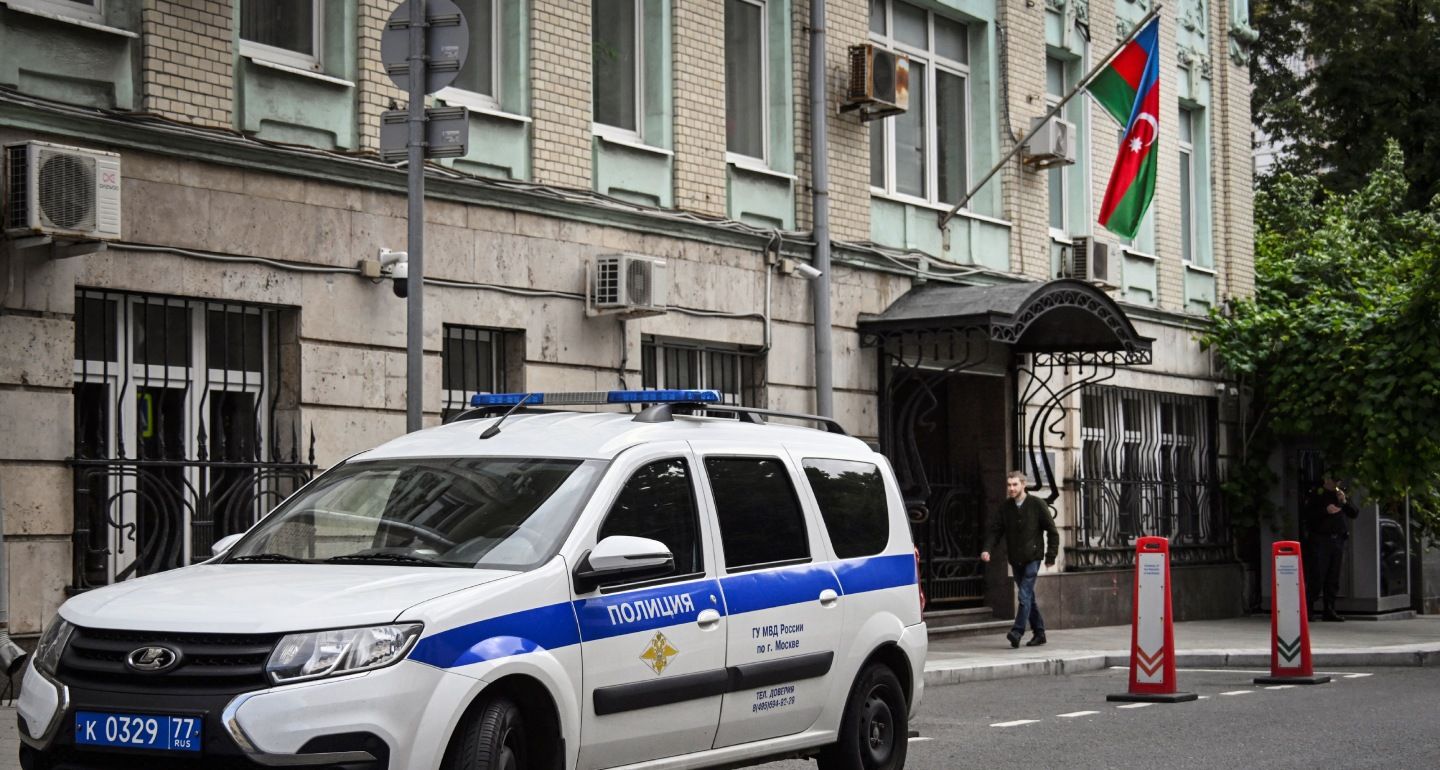The supposed threats from China and Russia pose far less of a danger to both Greenland and the Arctic than the prospect of an unscrupulous takeover of the island.
Andrei Dagaev
{
"authors": [
"Bashir Kitachaev"
],
"type": "commentary",
"blog": "Carnegie Politika",
"centerAffiliationAll": "",
"centers": [
"Carnegie Endowment for International Peace",
"Carnegie Russia Eurasia Center"
],
"englishNewsletterAll": "",
"nonEnglishNewsletterAll": "",
"primaryCenter": "Carnegie Russia Eurasia Center",
"programAffiliation": "",
"programs": [],
"projects": [],
"regions": [
"Azerbaijan",
"Caucasus",
"Russia"
],
"topics": [
"Foreign Policy",
"Global Governance",
"Security"
]
}
Фото: Getty Images
By falling out with the Kremlin, Azerbaijan’s authorities are trying to score points both at home and internationally—but all within boundaries that allow Russia to remain a key economic partner.
In a matter of days, relations between Azerbaijan and Russia have unexpectedly become unprecedentedly strained. It all began when several dozen ethnic Azerbaijanis were arrested in the Russian city of Yekaterinburg in connection with a series of murders that took place fifteen years ago. While in detention, the men were also beaten, and two brothers—the main suspects in the case—subsequently died. Baku’s response has been unusually strong by the standards of post-Soviet regimes, which are generally reluctant to risk falling foul of the Kremlin.
The Azerbaijani authorities not only accused Russian security forces of deliberately killing their nationals, they also canceled all cultural events related to Russia, raided the Baku office of Russia’s Sputnik news agency, and detained its employees and several Russian IT specialists who were, judging by subsequent photographs, also beaten and accused of drug dealing and cyberfraud. All of this was accompanied by harsh criticism of Moscow in state media, and Russian nationals in Azerbaijan now face regular document checks, sometimes by force.
Brutality and impunity among the security forces are hardly anything new on either side of the Russia–Azerbaijan border, but they have never previously led to such a crisis in relations. It would appear that the deaths in custody of two men—even ones accused of involvement in organized crime and the murder of ethnic Azerbaijanis in Russia fifteen years ago—are a convenient pretext for the Azerbaijani authorities to use a confrontation with Moscow to strengthen their position both at home and abroad.
Russia is bogged down in its war against Ukraine and isolated in the West by countless sanctions, which has made Azerbaijan an important logistics partner for Moscow. Since the start of the full-scale invasion of Ukraine, Moscow has been actively investing in transport infrastructure on Azerbaijani territory and projects along the Russia-Iran-India route.
At the same time, Russia’s initiative and influence in the South Caucasus has drastically weakened. First, Russian peacekeepers deployed to the disputed area of Nagorno-Karabakh after the 2020 Armenian-Azerbaijani war put up no resistance to Azerbaijan’s blockade of the region. Nor, in September 2023, did they intervene in Baku’s successful military operation to take control of Nagorno-Karabakh. And in the spring of 2024, the Russian peacekeeping contingent left the region ahead of schedule.
Baku made its first attempt to impose new rules on Moscow in late 2024, after Russian air defense forces apparently mistakenly shot down an Azerbaijan Airlines plane. Initially, Russia tried to sweep the tragedy under the rug, but Azerbaijan demanded publicly that those responsible be punished. Russia only succeeded in easing tensions after President Vladimir Putin personally apologized, compensation was paid out, and a monument to Heydar Aliyev, the father of current Azerbaijani President Ilham Aliyev, was erected in Moscow.
That episode demonstrated to Baku the possible benefits of a conflict with Moscow. Accordingly, as soon as Russia provided them with a suitable opportunity, the Azerbaijani authorities willingly entered a new round of confrontation.
With few successes elsewhere, victories over external adversaries have been the main source of President Aliyev’s popularity at home ever since his success in the second Karabakh war in 2020. Wealth inequality, low incomes, and the repression of any uncontrolled political and civil activity continue to plague the country.
Previously, Azerbaijani society was consolidated around the fight to take back control of Nagorno-Karabakh, but the initial euphoria from its successful return is gradually wearing off. An outright war with Armenia would be very risky for Baku for now, and even its closest ally Turkey might not support such an undertaking. In these conditions, a confrontation with a convincing external enemy like Russia is a convenient tool for uniting Azerbaijani society again and distracting it from both economic problems and issues over the legitimacy of President Aliyev, who inherited his post from his father back in 2003.
Disputes with Moscow also have international benefits. Azerbaijan has long sought to position itself in the West as a reliable energy partner and a stable secular force in the region. But that image is constantly undermined by waves of domestic repression. The current friction with the Kremlin is helping to shift the West’s focus from Baku’s domestic abuses to its “independent” and even “anti-Russian” position.
The standoff with Moscow is designed to show that Azerbaijan is not in fact an authoritarian ally of Russia, but a strategic partner of the West in the global confrontation with Russia, especially in the energy sector. Accordingly, it would be wiser for Brussels and Washington to turn a blind eye to the internal problems of a country that is so useful to them. Baku’s statements in support of Ukraine, and Aliyev’s recent phone call with Ukrainian President Volodymyr Zelensky were aimed at shoring up this image.
At the same time, the confrontation between Baku and Moscow, which so far has not gone beyond rhetoric and individual arrests, does not pose serious risks for Baku. Russia remains preoccupied with other issues entirely, and prefers to wait out the crisis in the hope that the escalation is temporary. The Kremlin has barely even reacted to the arrests and beatings of Russian nationals in Azerbaijan, and has blamed Ukraine for this “temporary” conflict between the two countries.
Taking advantage of Moscow’s passivity, Aliyev is trying to show that he can talk to it on equal terms, while remaining cautious enough to keep the conflict from spiraling out of control. Relations have not been cut off, agreements continue to be implemented, ambassadors remain in place, and no new trading restrictions have been put in place.
In other words, the two sides can easily drop the hostile rhetoric if necessary and continue as if nothing had happened. Aliyev has neither the opportunity nor, apparently, any desire to take this conflict any further. Baku cannot afford a full-fledged break with Moscow: Azerbaijan’s economy is too closely tied to Russia’s.
Russia remains one of the biggest suppliers of components, fuel, and other raw materials to Azerbaijan, as well as an important market for Azerbaijani agricultural produce. About 46 percent of the total volume of remittances paid to Azerbaijan come from Russia, where, according to official data alone, more than 300,000 Azerbaijanis live and work. If Moscow does anything to make life significantly worse for those labor migrants, Baku will face both economic losses and domestic political risks when they return.
By falling out with the Kremlin, Azerbaijan’s authorities are trying to score points both at home and internationally—but all within boundaries that allow Russia to remain a key economic partner. In this regard, Azerbaijani foreign policy bears a growing resemblance to that of Turkey: aggressive demarches followed by fresh rapprochements, conflicts without severing relations, and maneuvering between various blocs.
The current standoff, therefore, will likely die down without any lasting impact on the two countries’ relations, just like the dispute over the downed plane. But the very fact that such maneuvering has become possible in relations with Moscow speaks volumes. In the South Caucasus, Russia is becoming seen less and less as a force to be reckoned with, and it will be far more difficult for the Kremlin to restore its reputation in the region.
Carnegie does not take institutional positions on public policy issues; the views represented herein are those of the author(s) and do not necessarily reflect the views of Carnegie, its staff, or its trustees.
The supposed threats from China and Russia pose far less of a danger to both Greenland and the Arctic than the prospect of an unscrupulous takeover of the island.

Andrei Dagaev
Western negotiators often believe territory is just a bargaining chip when it comes to peace in Ukraine, but Putin is obsessed with empire-building.

Andrey Pertsev
Unexpectedly, Trump’s America appears to have replaced Putin’s Russia’s as the world’s biggest disruptor.

Alexander Baunov
Baku may allow radical nationalists to publicly discuss “reunification” with Azeri Iranians, but the president and key officials prefer not to comment publicly on the protests in Iran.

Bashir Kitachaev
The Kremlin will only be prepared to negotiate strategic arms limitations if it is confident it can secure significant concessions from the United States. Otherwise, meaningful dialogue is unlikely, and the international system of strategic stability will continue to teeter on the brink of total collapse.

Maxim Starchak